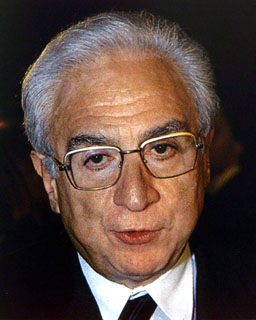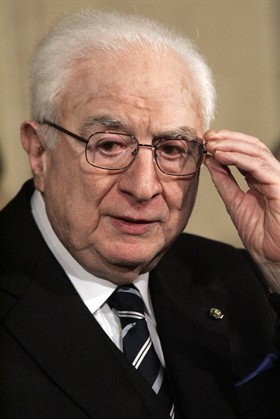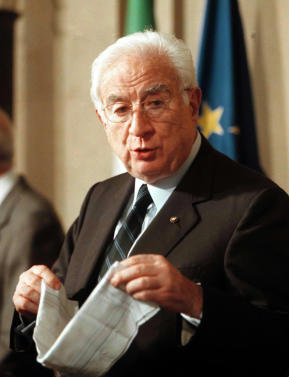<Back to Index>
- 8th President of Italy Francesco Cossiga, 1928
PAGE SPONSOR



Francesco Cossiga (July 26, 1928 - August 17, 2010) was an Italian politician, the 43rd Prime Minister and the eighth President of the Italian Republic. He was also a professor of constitutional law at the University of Sassari.
Cossiga was born in Sassari in the north of Sardinia. He
started his political career during World War II. His
name is now usually pronounced with the stress on the
second syllable, but it was originally pronounced with the
stress on the first syllable, meaning "Corsica". He was
the cousin of Enrico Berlinguer.
He was a minister several times for the Democrazia Cristiana party (DC), notably during his stay at Viminale (Ministry for internal affairs) where he re-structured the Italian police, civil protection and secret services. In 1977, when Cossiga was minister of internal affairs, police squads organized by Cossiga shot against a demonstration in Rome, killing student Giorgiana Masi. Cossiga for many years stated that she was killed by her companions.
He was in charge during the kidnapping and murder of Aldo Moro by Red Brigades, and he resigned when Moro was found dead in 1978. According to Italian journalist Enrico Deaglio, Cossiga to justify his lack of action "accused the leaders of CGIL and of the Italian Communist Party to know the location where Moro was detained". Cossiga was also minister of internal affairs when Fascist terrorists bombed Bologna station in 1980. He initially declared that it was a Fascist attack, but he later stated it was a Palestinian transport of weapons which went wrong. He also supported the innocence of Giusva Fioravanti and Francesca Mambro, who were later condemned for the bombing and for numerous murders, declaring: "They are good guys and they want me well."
During the early 1980s, Cossiga attacked several times the antimafia judges and spoke in favor of judge Corrado Carnevale, a member of the Corte di Cassazione (Italy's supreme court) who had annulled numerous sentences against mafia leaders and was later tried for these actions.
Cossiga was elected President of the Italian Senate 12 July 1983, a position he held
until 24 June 1985, when he
became the President of Italy.
Following his resignation as president of the Senate in 1985, Cossiga was elected President of Italy (Head of State). This was the first time a candidate had won following the first ballot (where a majority of over two thirds is necessary).
It was not until his last two years as President that
Cossiga began to express some unusual opinions regarding
the Italian political system. He opined that the Italian
parties, especially the DC (his own party) and Italian
Communist Party, had to take into account the deep changes
brought about by the fall of the Berlin Wall and the end
of the Cold War.
These statements, soon dubbed "esternazioni", or "mattock blows" (picconate), were considered by many to be inappropriate for a President and, often, beyond his constitutional powers; also, his mental health was doubted and Cossiga had to declare "I am the fake madman who speaks the truth."
Tension developed between Cossiga and the President of the Council of Ministers Giulio Andreotti. This tension emerged when Andreotti revealed the existence of Gladio, a stay behind organization with the official aim of countering a possible Soviet invasion through sabotage and guerrilla warfare behind enemy lines. Cossiga announced his involvement in the establishment of the organization. The Democratic Party of the Left (successor to the Communist Party) started the procedure of impeachment (Presidents of Italy can be impeached only for high treason against the State or for an attempt to overthrow the Constitution). Although he threatened to prevent the impeachment procedure by dissolving Parliament, the impeachment request was ultimately dismissed.
Cossiga resigned two months before the end of his term,
on 25 April 1992.
According to the Italian Constitution, after his resignation from the office of President, Cossiga became lifetime senator, joining his predecessors in the upper house of parliament, with whom he also shared the title of President Emeritus of the Italian Republic.
In February 1998, Cossiga created the Unione Democratica per la Repubblica (a political party), declaring it to be politically central. The UDR was a crucial component of the majority that supported the D'Alema government in October 1998, after the fall of the Prodi government which lost a vote of confidence.
Cossiga declared that his support for D'Alema was intended to end the conventional exclusion of the former Communist Party (PCI) leaders from the premiership in Italy.
In 1999 UDR was dissolved and Cossiga returned to his activities as a senator, with competences in the Military Affairs' Commission.
In May 2006 he brought in a bill that would allow the region of South Tyrol to hold a referendum, where the local electorate could decide whether to remain within the Republic of Italy, declare independence or become part of Austria again.
On 27 November 2006, he resigned from his position as a lifetime senator. His resignation was, however, rejected on 31 January 2007 by a vote of the Senate.
Cossiga died on 17 August 2010 because of respiratory
problems.
In 2007, in a statement published by the Italian newspaper Corriere della Sera, Cossiga commented on the 11 September attacks and on a video attributed to Osama Bin Laden 2001. He wrote that "all of the democratic circles of America and of Europe, especially those of the Italian center - left, now know well that the disastrous attack was planned and realized by the American CIA and Mossad with the help of the Zionist world to place the blame on Arabic countries and to persuade the Western powers to intervene in Iraq and Afghanistan". However, the previous year Cossiga had stated that he rejects theoretical conspiracies and that it "seems unlikely that the rather impossible September 11 was the result of an American plot."
In the same statement, Cossiga claimed that a video tape circulated by Osama bin Laden's al Qaeda and containing threats against Silvio Berlusconi was "produced in the studios of Mediaset in Milan" and forwarded to the "Islamist Al-Jazeera television network." The purpose of that video tape (which was actually an audio tape) was to raise "a wave of solidarity to Berlusconi" who was, at the time, facing political difficulties.
In 2008, Francesco Cossiga told about Mario Draghi: "He is a craven moneyman".
As President of the Republic, Cossiga was Head (and also Knight Grand Cross with Grand Cordon) of the Order of Merit of the Italian Republic (from 3 July 1985 to 28 April 1992), Military Order of Italy, Order of the Star of Italian Solidarity, Order of Merit for Labor and Order of Vittorio Veneto and Grand Cross of Merit of the Italian Red Cross. He was also bestowed honors and awards by other countries.